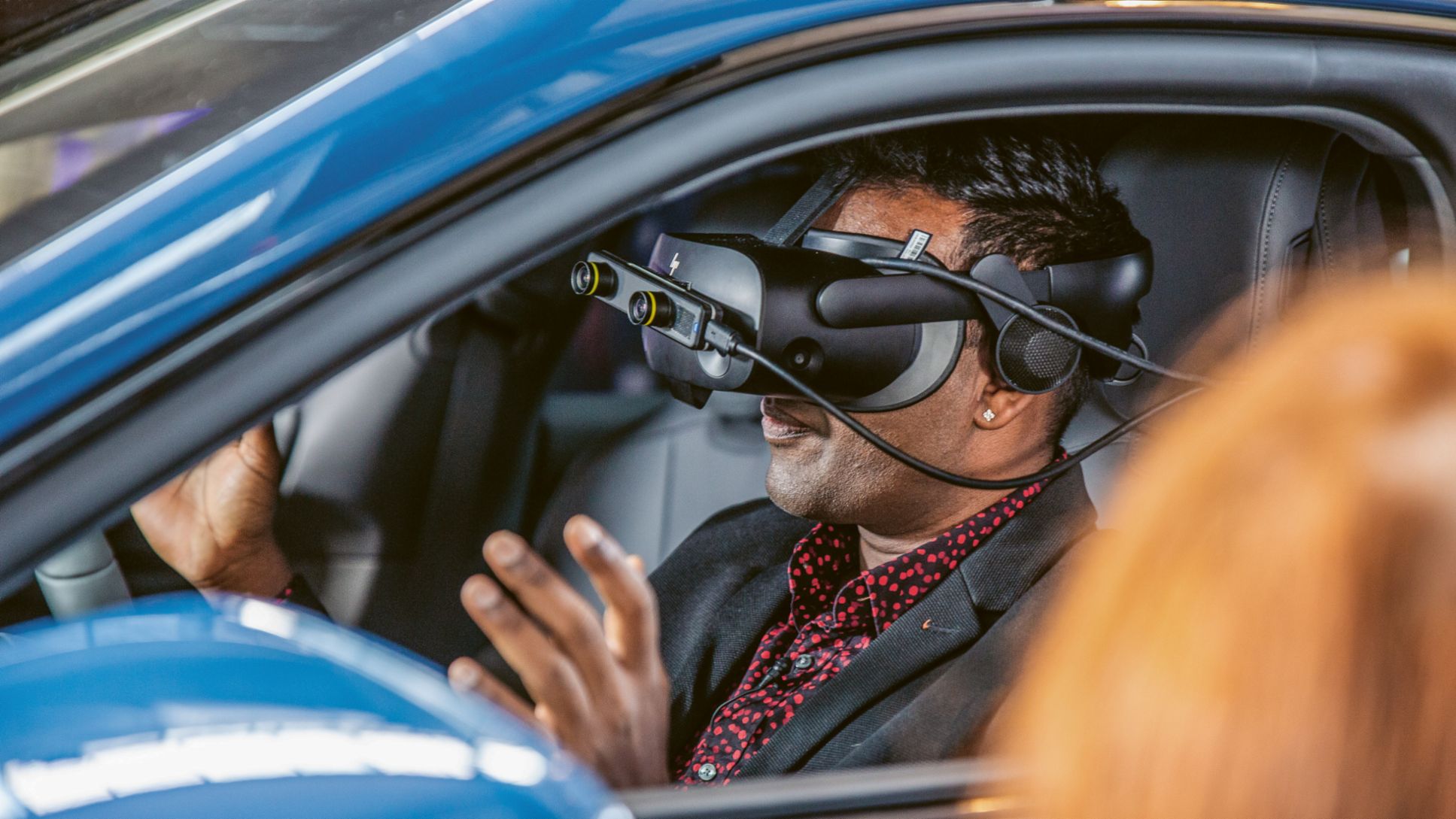“Procurement is ready for the challenges of transformation – we are seizing opportunities and actively shaping the company’s automotive future.” Uwe-Karsten Städter, Member of the Executive Board – Procurement (until 18 August 2021)
The Procurement department is a key interface at Porsche. Its purchasing volume exceeded nine billion euros in the last financial year, equating to approximately 80 per cent of the company’s value creation. Procurement therefore has a significant influence on environmental protection and sustainability beyond the factory gates. Together with its partners, Porsche is committed to achieving a shift in personal mobility in the direction of balance-sheet CO₂ neutrality. The company’s good collaboration with the suppliers is demonstrated by the successful launches of the new passenger vehicle production models 911 GTS, 911 Targa GTS, 911 GT3, 911 GT3 Touring, Boxster 25 years, Cayenne Turbo GT, Macan Facelift, Taycan Cross Turismo and Taycan Sport Turismo.
Volatile supply chains
The entire industry was hit by shortages in the semiconductor market in 2021. At the same time, demand for microchips increased and vehicle production in the automotive industry consequently slowed down. Porsche established a task force within Procurement early on. This engages in ongoing communication with the Volkswagen Group, chip suppliers and tier 1 suppliers. Lessons were learned from the supply shortages – the impact of material shortages, logistics issues and geopolitical influences on Porsche’s parts procurement is to be identified and mitigated on the basis of greater supply chain transparency. Possible countermeasures include building up parts inventories and making use of alternative components. Intensive communication with potentially critical suppliers has an important part to play here.
Change in department leadership
The head of the department changed in August 2021 when Uwe-Karsten Städter went into retirement. He had been the Porsche Executive Board member responsible for Procurement for 10 years. In all, Städter worked for the Volkswagen Group for 47 years. He was succeeded by Barbara Frenkel. Oliver Blume, Chairman of the Executive Board of Porsche AG, comments as follows on the change in leadership: “Uwe-Karsten Städter is one of the most experienced purchasing experts in the automotive industry. Porsche’s procurement was prepared for the challenges of transformation in an exemplary manner both operationally and strategically under his leadership. In Barbara Frenkel, we found a highly capable successor within the company ranks.”
Barbara Frenkel began her career at Porsche in 2001 as Head of Quality Systems and Methods. Following various management positions, she became of Head of European Sales in 2017. She increased the retail volume in Porsche’s third-largest sales region by around 10 per cent and played a significant part in further developing the dealer organisation. Barbara Frenkel was also a member of the Porsche AG Supervisory Board from 2019, a position which she stepped down from upon accepting the Executive Board role.
Porsche is increasingly embedding its processes in universal end-to-end logics. This is strengthening cross-departmental work and placing the overall company perspective at the forefront of its actions.
A new kind of collaboration
For the department employees, the last financial year was characterised by mobile working. “As was also the case in 2020, protecting people’s health took priority. A large proportion of the employees therefore worked almost entirely from home again in 2021,” says Barbara Frenkel, Member of the Executive Board responsible for Procurement. “This was challenging for everyone – but it worked very well. We see opportunities in the crisis – we identified benefits for our organisation from using digital communication technologies and we intend to maintain and develop them.”
One example here is collaboration with the suppliers. Previously, a number of experts had to travel to a supplier in order to optimise or audit the processes. Now only one Porsche employee is on the road, equipped with data glasses that they put on at the destination.
Porsche is increasingly embedding its processes in universal end-to-end logics. This is strengthening cross-departmental work and placing the overall company perspective at the forefront of its actions.
The co-workers in Rutesheim or Weissach can then gain the same impression as the employee in the field thanks to a live stream. Far from being a stopgap measure, digital supplier inspection delivers excellent results and will continue to be used by Porsche’s Procurement department in the future.
Porsche actively supported its suppliers in the last financial year. The partners supply jointly developed parts, some of which are highly specialised. For this reason too, Porsche does not abandon its partners in a crisis. For example, in the case of small and medium-sized suppliers in particular, the sports car manufacturer made part payments for development costs and tools ahead of the contractually agreed deadlines.
“Procurement has a clear sustainability strategy, which we are implementing together with the suppliers. We are generating important momentum on the way to achieving BALANCE-SHEET CO₂ neutrality.” Barbara Frenkel, Member of the Executive Board – Procurement (since 19 August 2021)
A sustainable and transparent supply chain
Porsche is also shaping the path to greater sustainability on the basis of partnership with its suppliers. Transformation in the direction of electromobility will increase the supply chain’s share of the company’s CO₂ footprint from the current 20 per cent to around 40 per cent by 2030. To counteract this, Porsche has required its series suppliers to use renewable energies for all contracts newly awarded since July 2021. This has been the case for its battery cell suppliers since 2020. An additional approximately 1,300 series suppliers will now gradually follow. This measure is an important step in further reducing the CO₂ emissions caused by the supply chain.
Since 2019, the suppliers have been bound not only by costs and quality, but also by sustainability criteria. This is documented in the sustainability rating, or S-rating for short. A large proportion of the suppliers that have submitted a tender for a contract already meet the Porsche requirements. In addition, the Porsche procurers discussed concepts and innovations with suppliers in the last financial year in what are known as sustainability dialogues. Together, they defined concrete CO₂ reduction measures.
As part of Porsche’s comprehensive sustainability strategy, procurement is also about good labour conditions, anti-corruption and the upholding of human rights throughout the supply chain. The company has therefore been a member of the Responsible Mica Initiative (RMI) since 2020, which champions better mining conditions in relation to the raw material mica. These pigments feature among other things in car paints and are primarily mined in India. The RMI ran projects in 80 villages in the primary mining regions in Jharkhand and Bihar in the last financial year with the aim of establishing appreciation of more sustainable mining methods and offering the mine workers better prospects in life. Since 2021, Porsche has been assuming responsibility with a position on the RMI Board of Directors – the company actively helps shape the initiative’s strategy. Among other things, Porsche is developing cross-industry mica mining standards.
Together with the tyre manufacturer Michelin, Porsche also promotes sustainable natural rubber production. The two companies are championing transparency and better labour conditions in the production of this raw material in Sumatra, Indonesia, through the CASCADE (Committed Actions for Small-holders Capacity Development) project. The local smallholders are offered training in production practices, biodiversity and occupational health and safety with the aim of improving their livelihoods and economic situation in the long term. Indonesia is one of the world’s primary rubber producers. Based on analyses and talks held locally, Porsche and Michelin identified potential supply chain risks related to rubber production. CASCADE is one of the first projects in the world to tackle the lowest level of the natural rubber supply chain. More than 1,000 smallholders are being given training to make their production methods more environmentally friendly and more efficient. Porsche and Michelin are investing some one million euros in the project which is initially set to run until 2024.
The innovative pilot project Prewave helps to identify sustainability risks in the supply chain. Porsche is making use of artificial intelligence (AI) here. The Prewave system can forecast such risks in the lower supply chain levels, with the technology analysing supplierrelated news in more than 50 languages. The news is sourced from publicly accessible media and social networks in more than 150 countries. As such, AI is serving as a proactive early-warning system for violations of the company’s sustainability requirements. The Procurement department then examines the matter and possibly introduces countermeasures.
In 2021, the Volkswagen Group signed up to the cross-industry initiative Catena-X. This cloud-based data ecosystem is open to companies in the European automotive industry as well as their suppliers and partners. Its purpose is the secure exchange of data and information all along the value chain. Its aim is to make supply chains more transparent, more sustainable and more efficient on the basis of uniform standards and shared principles. Twenty-eight companies and organisations are Catena-X consortium partners, including all the major German automobile manufacturers.

Process efficiency and innovation management
Greater efficiency is also the focus of the digitalisation of the Procurement department itself. The employees have been working with chatbots since 2021. These little communication programs give automated responses to questions, thereby eliminating research on the part of the employees. Bot technology has been further developed with the Porsche Procurement Assistant (PPA). Attractive bot programs are in use within the complex SAP system, lightening the Porsche procurers’ workload. These programs support the most common operating steps and, if necessary, also see to standard routines themselves. Up to 90 per cent of mouse clicks can be eliminated thanks to PPA. The system is now significantly more user-friendly. In particular, it enables new employees to find their feet in company-specific work processes more quickly.
Porsche is reducing the time between an idea and the product with innovation management which is applied across all departments. The Procurement department is making an important contribution here with the Startup Autobahn innovation platform. This forges contacts with innovative young businesses. The company founders are then given the opportunity to expedite ideas together with Porsche experts for several months. The concepts developed are presented twice a year during an Expo Day. The feedback has been positive – to date, Porsche has initiated approximately 80 projects as part of Startup Autobahn. Around a third of these has led to a concrete product or service for Porsche customers. Innovation management and Startup Autobahn are key components of Strategy 2030 and continue to be further developed.
The same goes for the traditional procurement work steps – Porsche is increasingly embedding its processes in universal end-to-end logics. This is strengthening cross-departmental work and placing the overall company perspective at the forefront of its actions. A good example here is Purchase-to-Pay – the company is creating a universal process across procurement, production and finance that encompasses everything from the requirements and purchasing to goods inward and invoicing. This method is expected to have optimisation potential of around 10 per cent up to 2030. Porsche intends to apply end-to-end logics to a further 12 core processes by 2030.

